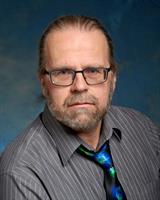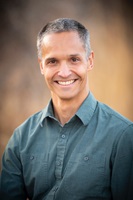ABOUT THE PROGRAM

Rytis Prekeris, PhD
Professor and Director, Molecular Biology Program

Michael McMurray, PhD
Associate Professor and Associate Director, Molecular Biology Program
Contact Michael McMurray
McMurray Faculty Profile
The Graduate Advisory Committee (GAC)
The GAC is a small group of faculty who deal with important issues regarding the Molecular Biology Program, as they arise. GAC faculty also serve as additional mentors for our students, beyond their thesis advisor and committee members.
Suja Jagannathan (Chair)
Contact Sujatha jagannathan
Bruce Appel
Contact Bruce Appel
Eric Pietras
Contact Eric Pietras
Katherine Fantauzzo
Contact Katherine Fantauzzo
Molecular Biology Program Overview
The Molecular Biology Program has been supported by a T32 from the National Institutes of Health since 1999, which supports graduate student training in their second and third years.
The Molecular Biology Program is dedicated to providing rigorous training to its students in a supportive environment. Molecular Biology faculty are members of many different departments and are applying the techniques of molecular biology to answer questions in diverse areas. Molecular biology, the science of how living things work at the molecular level, has led the recent revolution in our understanding of human disease and gave birth to the biotechnology industry. In almost all aspects of modern biomedical research, a professional knowledge of molecular biology is essential. Our training program is designed to equip students for careers at the cutting edge of biology.
Sign up for our mailing list.
Student Handbook
Detailed information about the program, program curriculum, student requirements, policies, and procedures can be found in the Molecular Biology Student Handbook.
Anschutz Medical Campus
The Molecular Biology Program is located on the CU Anschutz Medical Campus, one of four University of Colorado campuses serving the Rocky Mountain region. CU Anschutz is 6 miles east of downtown Denver in Colorado’s third largest city, Aurora. CU Anschutz is one of the newest health sciences campuses in the nation and is the largest academic health center in the Rocky Mountain regional area. With funding totaling more than $450 million annually, CU Anschutz has become a national leader both in health care and life sciences research through a combination of teaching, research, and clinical facilities. The campus provides a variety of state-of-the-art facilities. Graduate students in the Molecular Biology Program interact with many sectors of campus, yielding a highly interdisciplinary and collaborative training program.

Program Mission and Objectives
The mission of the Molecular Biology (MOLB) T32 Training Program at the University of Colorado Anschutz Medical Campus (CU Anschutz) is to train outstanding academic and industry scientists, educators, advocates, and policy makers who become future leaders in their chosen fields and disciplines. We aim to develop a diverse pool of well-trained scientists with the technical and professional skills necessary to conduct rigorous and reproducible research. To fulfill this mission, the MOLB Program has defined five objectives that convey our approach to research and professional training.
Objective 1 is to provide broad training in foundational molecular and cellular biology with focused research opportunities in diverse disciplines (e.g., bioinformatics, cell biology, cancer biology, developmental biology, epigenetics, immunology, microbiology, RNA biology, and structural biology). Our broad interdisciplinary training is a key to the success of our trainees and a defining feature of MOLB relative to other CU Anschutz training programs. The scientific breadth of our faculty exposes our trainees to many different techniques and provides opportunities for students to combine different approaches to answer their own scientific questions. We cultivate a collegial environment across the program, encouraging intellectual exchange and collaboration between labs from many departments.
Objective 2 is to provide student-oriented and well-balanced training that emphasizes development of creative and independent thinking, strong communication skills, and professional responsible conduct. A key to MOLB training is its focus on developing professional skills including teamwork, science communication, project management, and leadership. The MOLB Program incorporates many technical, operational, and professional elements to provide balanced training for our students.
Objective 3 is to develop and apply the newest techniques that drive advances in science. As the late Sydney Brenner articulated, “Progress in science depends on new techniques, new discoveries, and new ideas, probably in that order.” A primary objective of the MOLB Program is to position our graduates to lead the forefront of scientific technology deployment and development. We develop scientists who are well-versed in existing scientific techniques and capable of developing their own experimental approaches to answer new questions. We combine rigorous “wet” and “dry” laboratory training, intensive discussion of current literature, workshops, and mini-courses that focus on emerging techniques for molecular and cell biology research.
Objective 4 is to promote the career advancement of our trainees and introduce them to a broad range of career choices. The MOLB program provides skills and opportunities for experiential learning needed to succeed in many science-related careers, including academic research, consulting, teaching, government and public policy, technology transfer and patent law, science writing, and science communication.
Composition
- 60 full time PhD students
- 73 faculty from 12 different departments
- 18% students from underrepresented backgrounds
- 70% female students
Activities
- Annual retreat in the Rocky Mountains
- Weekly seminar series
- Monthly student-led roundtables
- Annual spring symposium
History and Statistics
- Founded in 1987
- Graduates to date: 143
- Time to graduation: 5.6 years (mean)
- Average number of published papers at time of graduation: 3
- Funded by NIH T32 since 1999
- Has Bolie Family endowment since 2001
Student Support
Students accepted in the PhD program are provided full tuition, health and dental insurance, and a stipend of $41,910 per year for living expenses. Continued support is contingent upon satisfactory academic and research performance by the student. When a student enters a thesis lab, the thesis mentor assumes complete responsibility for the student’s stipend, benefits, tuition, fees, and associated research costs.
Curriculum
The program is designed for students to complete the PhD degree in five to six years and is geared to train students for successful careers in biomedical research. The number of courses required is fairly limited, thus providing ample time and flexibility for pursuit and development of individualized research interests. There are no teaching assistant requirements. Stipends for students are provided for laboratory research.
Learning Outcomes for the Molecular Biology PhD Program
Graduate education in general | Doctoral education is the foundation of future scholarship and the “engine” of the research enterprise. It prepares future faculty and leaders in the academy and other areas of industry and society.
Molecular Biology program in specific | Doctoral education in Molecular Biology prepares students to contribute to our understanding of the basic cellular and molecular pathways and processes that contribute to both normal and pathological physiology.
Program/Student Learning Outcomes | The PhD program in Molecular Biology trains graduate students to become proficient and successful investigators who are able to:
- Demonstrate a basic knowledge of central concepts in the biomedical sciences.
- Understand the current concepts in Molecular Biology.
- Read and critically evaluate the scientific literature.
- Formulate hypotheses based on current concepts in the field and design, conduct, and interpret their own research projects.
- Present research results in peer-reviewed publications and in a dissertation.
- Communicate research results effectively through oral presentations at scientific seminars, conferences, and other venues.
- Understand the principles of scientific rigor, repeatability and reproducibility
- Write a competitive application for research funding.
- Develop ancillary skills, where necessary, to obtain positions outside of scientific research.
First year
The first year is devoted largely to course work, with students taking the Biomedical Sciences Core Course in the fall semester with other incoming CU Anschutz PhD students, as well as a research ethics course. First year students also rotate through three different laboratories to learn about research areas and methods from different Molecular Biology training faculty. In the spring, Molecular Biology first years take Advanced Topics in Molecular Biology, which covers critical thinking, experimental design and grant writing skills, and is designed to prepare students to pass their preliminary exam after the end of the semester. The preliminary exam format is in the form of a written mini-proposal, which is defended in a one hour oral exam administered in early June by a standing faculty committee. After successful completion of these requirements, students select a thesis mentor and begin their thesis research.
Second year
The majority of time in the second year is spent in the laboratory developing a research thesis project. Required coursework in the second year includes Biostatistics in Research in the fall, and Rigor and Reproducibility in Biomedical Research in the spring semester. After completion of the 2nd year, students take their comprehensive examination to advance to the PhD candidacy. This examination consists of a written thesis proposal in the form of a research grant application and an oral defense in front of the student’s thesis committee.
Third year & beyond
Students are expected to form a thesis committee and pass their comprehensive exam by the end of the fall semester in their third year. The fourth year and beyond are devoted almost entirely to research. During this period, students continue to participate in program events, and are required to continue to meet at least annually with the thesis advisory committee during their final year(s). Students also take a refresher course in biomedical ethics in their fourth or fifth year in the program. It is the goal of the program for students to complete their thesis research and to successfully defend their thesis by the end of their fifth year.
Outreach and Advocacy
Many student-run professional organizations provide opportunities to get involved in leadership, community outreach, and graduate student advocacy. See a list of our student groups and organizations.
